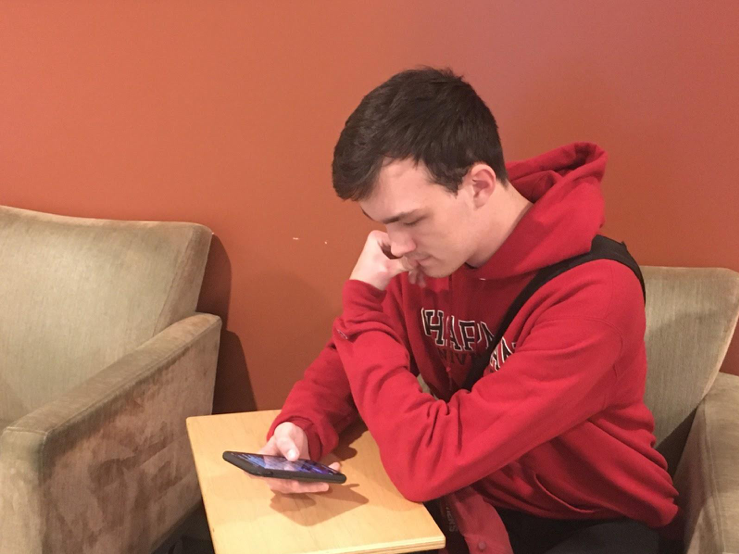
~~~~~~~~~~~~~~~~~~~~~~~~~~~~~~~
Every morning, Brandon Winchester wakes up and reads a hard copy of the New York Times, keeping up with current events throughout the day by scrolling through the Washington Post’s Twitter account in between classes.
But just can’t understand why his friends won’t do the same.
“It’s very disconcerting to me that people aren’t as well informed today,” said the junior film studies major and political science minor.
In a world more connected than ever before, college students have constant access to the news, yet the struggle to stay informed persists. Facebook ads, snapchat stories, and a free subscription to the New York Times doesn’t seem to be enough for Chapman University students.

But not all hope is lost. Tim Topper, the program coordinator for the Cross-Cultural Center and Civic Engagement Initiatives, said that in his experience Chapman students tend to be more in tune with the outside world than the average college student. He seems to be right.
Chapman’s student voting rate is 6.8 percent higher than the national average for college students, according to the National Study of Learning, Voting, and Engagement. In 2016, 81.6 percent of Chapman students registered to vote in the presidential election, up from 10 percent in 2012, and 57.2 percent voted in the elections.
“A lot of our students aren’t afraid to do research,” said Topper. He said that most students use social media to stay informed.
“Chapman students are not totally ignorant to issues that are happening around them,” said Topper, but students do tend to pick certain issues to focus on that they are passionate about. He said that students usually don’t follow up with action based on the news they’re hearing.
“It never gets past social media social justice advocacy,” said Topper. He said Chapman students will often use Facebook profile filters or share posts to raise awareness for an event or issue, but that is generally the extent of the action.
When asked whether or not students read the news regularly, a number of factors come into play.
“My friends know all about the big stuff, but they don’t know enough to make an argument or understand the full scope and details of a situation. Primarily because it takes time that they don’t have,” says Winchester.
With the stress of a full class load or balancing work and school, it’s no surprise that students don’t have much free time, and many would rather spend the little time they do have on other priorities rather than reading the news. Alissa Hattori and her friends at Chapman fall into this category of students.
“Everyone in my friend group is pretty well-informed and we try to stay on top of it as much as possible, but when school comes around and it gets too busy it stops being the biggest thing on our minds,” says Hattori, a junior health science major. Hattori says that she reads news updates once or twice a day but even this gets difficult when her workload increases.

Like many college students, Hattori uses Twitter to get her daily updates on the happenings of world news. She cites the convenience of every major news outlet being in one place as her main reason for turning to social media to stay informed.
“Twitter is the easiest way to get my information. People typically break it down into words that you can understand and give the most important facts that you should know,” said Hattori. She also said that major news outlets, including CNN and the New York Times, often post links to articles that she clicks on when she wants to know more.
Though he recognizes that most college students do not take the time, Winchester actively seeks out the news every day and rarely relies on push notifications or social media to keep him informed, unless there is a major news update.
“I basically dropped everything I was doing that afternoon to read everything on that story,” said Winchester about the recent impeachment inquiry in the U.S. House of Representatives. He said it takes a major update for a push notification to grab his attention, despite it being more convenient to simply read the notifications.
Even when students manage to find time in their packed schedule to flick through the news, it can be hard to find the motivation when most stories report primarily on unfortunate events happening around the world. With the majority of headlines spreading grim news, it’s no wonder that students don’t feel the need to pick up a paper.
Mitali Shukla, a junior sociology and strategic and corporate communications major, took a break from reading the news when President Trump was elected. She said that the constant onslaught of political, and often negative, news prompted the much-needed break.
Shukla started reading the news again during Brett Kavanaugh’s confirmation hearing for his seat on the Supreme Court. She said she was upset by the situation and couldn’t stay uninformed after hearing the accusations against Kavanaugh.
“Being ignorant is a privilege,” said Shukla. She recognized that for a period of time the need to stay informed was overshadowed by the mental toll it takes on her to read the news. Shukla’s role as the features editor for the Panther has also forced her to be more in tune with events off of Chapman’s campus.
Shukla said that despite the mental toll she faces when reading the news, she feels like many people use the emotional aspect to excuse their ignorance. She said that Chapman students tend to be less aware of the world outside of campus since the Chapman community is more affluent and students aren’t forced to step outside of their comfort zone and face the challenges that often come up in the news.
Winchester said also that the news can often be dry and difficult to keep up with due to the emotional toll but that he values the effect it can have in society.
“It’s all about creating a dialogue and people sometimes need that push when figuring out how to talk about certain issues,” said Winchester. He also said that the news can force people to think about the world around them and how they can make it better, but only if they’re willing to tune in in the first place.
Even though many students can’t find the energy to read through the most recent headlines, Chapman’s news source The Panther is still seeing an increasing trend in their readership.
“Close to 21,000 page views at a school with 8,000 students goes to show that not only are students reading our work but people that are in faculty, administration, and maybe even outside of the Chapman environment are looking to us to serve as a voice on campus,” says Louisa Marshall, Editor in Chief at The Panther.
Despite the increase in readership of the Panther, Hattori says news stories at Chapman are the last priority for her when it comes to staying informed.
“I’m not informed at all about Chapman news. I don’t seek it out and if I hear about it at all, it’s through friends,” said Hattori. She focuses more on state and national news.
College students and younger generations are crucial audiences for news outlets. These are the people who will have a large impact on the future of the world around them. The voices of youth have a lasting influence, and by staying informed, they are able to participate in and begin to work towards solutions for the grievances that the world is currently facing.
Though current events may not always be a source of positive news, it’s crucial that students still read these stories, argues Marshall.
The only way to change the headlines on the front pages of newspapers from devastating stories to messages of hope is for people to become more involved in current events and make sure their voices are heard.
